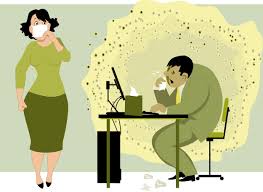The problem may be that sick-pay rules are too strict for employees, not too generous. Given the need to pay the rent, many low-paid workers may feel they have to work unless they are so sick as to be physically incapable of leaving the house. But things may be changing. In America the Democrats have long proposed statutory sick leave. President Donald Trump now talks of emergency relief for sick workers.
問題可能是病假工資規(guī)定對員工來說太嚴(yán)格了,并不太慷慨。考慮到付房租的需要,許多低收入的工人可能覺得他們必須工作,除非病得很重,出不了屋。但情況可能正在改變。在美國,民主黨人早就提議法定病假。唐納德·特朗普總統(tǒng)現(xiàn)在談到了對生病工人的緊急救濟(jì)。

British policy has also shifted. Statutory sick pay will now be payable on the first day of absence, rather than the fourth. In its budget on March 11th the government removed a minimum income requirement that kept many part-time workers from qualifying for sick pay. It will also allow workers to get a sick note online rather than travel to a clinic and risk infecting other patients. Further change may still be needed. The statutory weekly rate, at £94.25 ($123), is less than 20% of average earnings, and may tempt more workers to turn up when feeling iffy.
英國的政策也發(fā)生了變化。法定病假工資將在缺勤的第一天支付,而不是第四天。在3月11日的預(yù)算中,政府取消了一項(xiàng)最低收入要求,這項(xiàng)要求使許多兼職工人沒有資格獲得病假工資。它還將允許員工在網(wǎng)上獲得病假條,而不是去診所,冒著感染其他病人的風(fēng)險(xiǎn)。可能還需要進(jìn)一步的改變。每周的法定工資為94.25英鎊(123美元),不到平均收入的20%,這可能會吸引更多的員工在感到不確定的時(shí)候來上班。
At some stage in their careers most people will have turned up to work when they were feeling under the weather, be it because of a looming deadline or for fear of displeasing their boss. The health of fellow citizens, whether at work or on public transport, tends to be treated as collateral damage.
在職業(yè)生涯的某個(gè)階段,大多數(shù)人都是在感覺不舒服的時(shí)候去上班的,可能是因?yàn)榕R近的最后期限,也可能是擔(dān)心會讓老板不高興。同胞們的健康,無論是在工作中還是在公共交通上,往往被視為附帶損害。
In a world where global travel is common and easy, and diseases have the scope to spread quickly, social norms may therefore need to change. That means not just washing hands, or indeed forgoing the handshake as a greeting. It could also require a shift in attitudes towards workers who turn up while sick and potentially infectious, from plaudits for their diligence to scorn for their lack of consideration.
在一個(gè)全球旅行普遍且容易的世界里,疾病有可能迅速傳播,因此社會規(guī)范可能需要改變。這意味著不僅僅是洗手,或者實(shí)際上放棄握手作為一種問候。它還可能需要改變對那些在生病和可能有傳染性的時(shí)候出現(xiàn)的員工的態(tài)度,從對他們勤奮的贊揚(yáng)到對他們?nèi)狈紤]的輕蔑。
Countering pandemics requires all sorts of public action, from forging new social norms to devising vaccines that authorities have the duty to supply. Ensuring that workers do not have a financial incentive to spread disease is another example. That requires governments to guarantee a decent level of sick pay, and rules on sick leave that do not punish responsible citizens.
抗擊流行病需要各種各樣的公共行動,從建立新的社會規(guī)范到設(shè)計(jì)政府有責(zé)任提供的疫苗。另一個(gè)例子是確保工人沒有傳播疾病的經(jīng)濟(jì)動機(jī)。這就要求政府保證合理的病假工資水平,并制定不懲罰負(fù)責(zé)任的公民的病假規(guī)定。
譯文由可可原創(chuàng),僅供學(xué)習(xí)交流使用,未經(jīng)許可請勿轉(zhuǎn)載。












